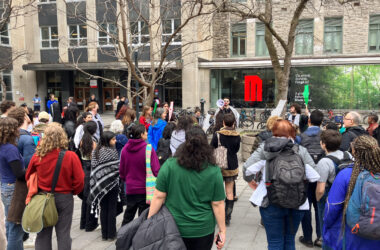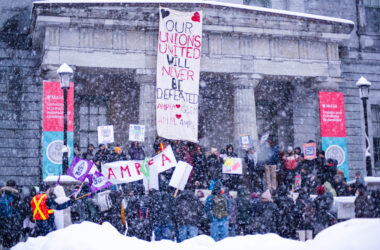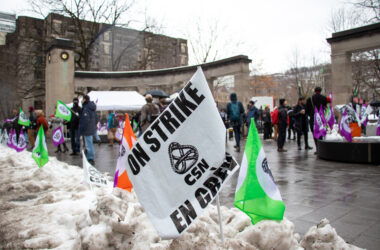From March 13 to 18, the Students’ Society of McGill University (SSMU) Indigenous Affairs Committee hosted the second annual Indigeneity and Solidarity Week in conjunction with the Indigenous Student Alliance (ISA), the American Indian Science and Engineering Society, the Indigenous Studies Program, and First Peoples’ House. Speakers conducted workshops, panel sessions, and public lectures to shed light on Indigenous issues in North America.
This year, the SSMU Indigenous Affairs Committee opted to title the event series Indigeneity and Solidarity Week instead of Indigeneity and Allyship Week. SSMU Vice-President (VP) University Affairs Erin Sobat, one of the main organizers of the event, attributed the rebranding to the problematic nature of allyship, a concept that he claimed prioritizes settler validation over the needs of Indigenous peoples. Sobat said the Indigenous Affairs Committee wished to prioritize Indigenous communities.
“The committee was particularly focused on creating spaces for Indigenous students and staff to think about resurgence and revitalization, or how we can best push back against colonialism and develop responses to contemporary issues in ways that prioritize Indigenous needs and narratives,” Sobat said.
Primarily organized and run by students, the event series encouraged relatable content. Sobat expressed his interest in the week also acting as a platform to hold the McGill administration accountable to their promises of self-reflective education.
With their grassroots, rather than an institutional, perspective, the organizers invited renowned activists and cultural figures to headline the week. One of the guest lecturers was Kyle T. Mays, a Black and Saginaw Anishinaabe post-doctoral scholar at the University of North Carolina at Chapel Hill. Mays’ expertise covers urban Indigenous history, Indigenous popular culture, and Afro-Indigenous studies.
On March 17, Mays ran a workshop on creating safe spaces in neoliberal universities. Mays urged attendees to discuss their definitions of diversity and their opinions on the 150th anniversary of Canada. On the latter, many participants felt that the country’s anniversary celebrations did not acknowledge Canada’s colonization process involving forceful assimilation and mistreatment of Indigenous peoples.
“Solidarity is important to move forward, especially now in the context of Canada’s 150th birthday and Black Lives Matter,” Mays said.
Mays followed the workshop with a public lecture on Black and Indigenous Solidarity on Turtle Island, referring to North America. He discussed the dichotomy in the historic relationship between Black and Indigenous communities. Of particular concern was how Black groups contributed to the oppression and dispossession of Indigenous people, such as the role that African-American buffalo soldiers played in the U.S. government’s Western expansionist plans. Mays found that the pursuit of Black liberation often came at the expense of accounting for Indigenous sovereignty.
However, Mays also cited instances where the two communities empowered each other’s movements. For example, Native-Americans participated in protesting the Flint water crisis, a situation that heavily affected African-Americans. Mays emphasized the value of the two communities’ cooperating to resolve the common issue of colonial behaviour.
“We can’t really engage in decolonization without an inclusive idea of decolonization that includes African-American people and others,” Mays said.
Kahawihson Horne, an Indigenous student at Concordia University in her second year of First People Studies, described Mays’ teachings as an instruction manual for young activists.
“He was talking about how self-care is one essential part of being an activist,” Horne said. “That just because someone is from the same community, band, or nation as you that does not necessarily make them your kinsfolk.”
Indigeneity and Solidarity week finished with the ISA’s full-day conference on the role of Indigenous arts in the revitalization of the community on March 18.









